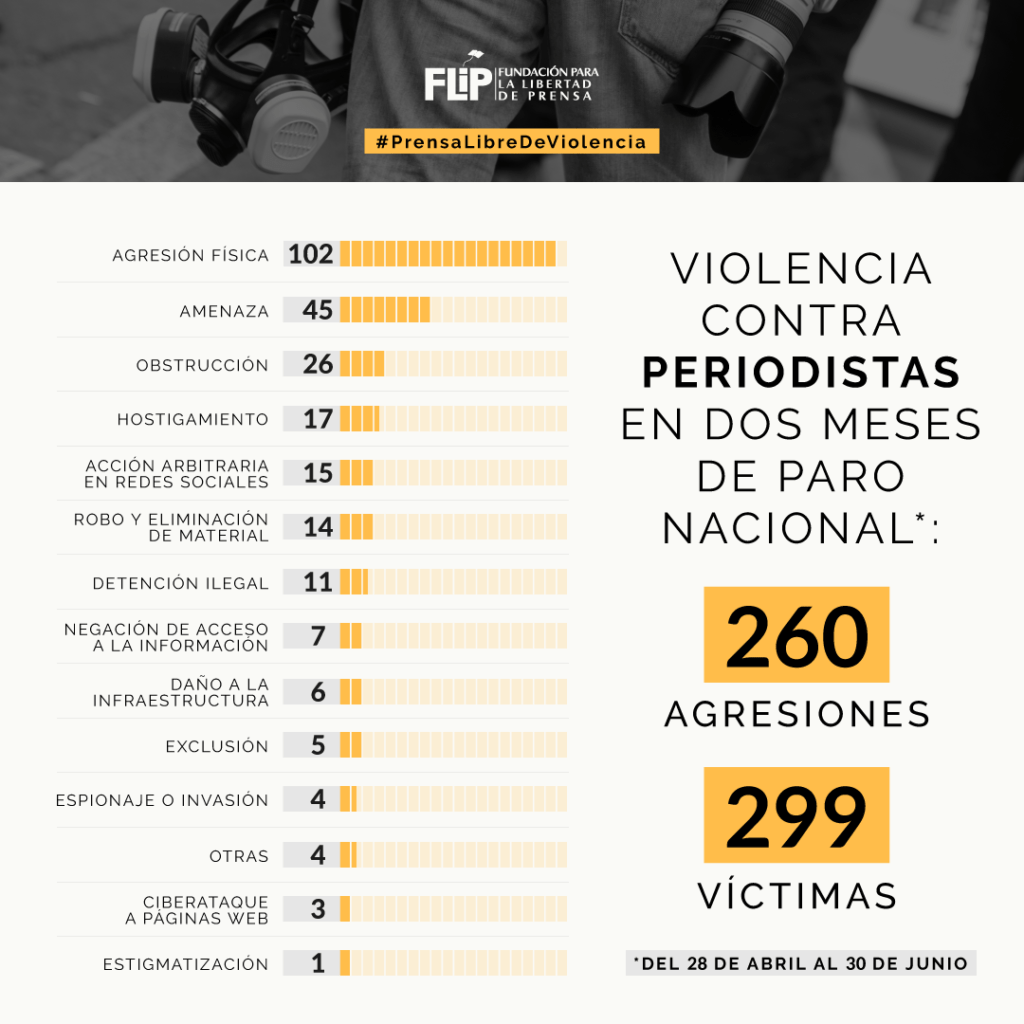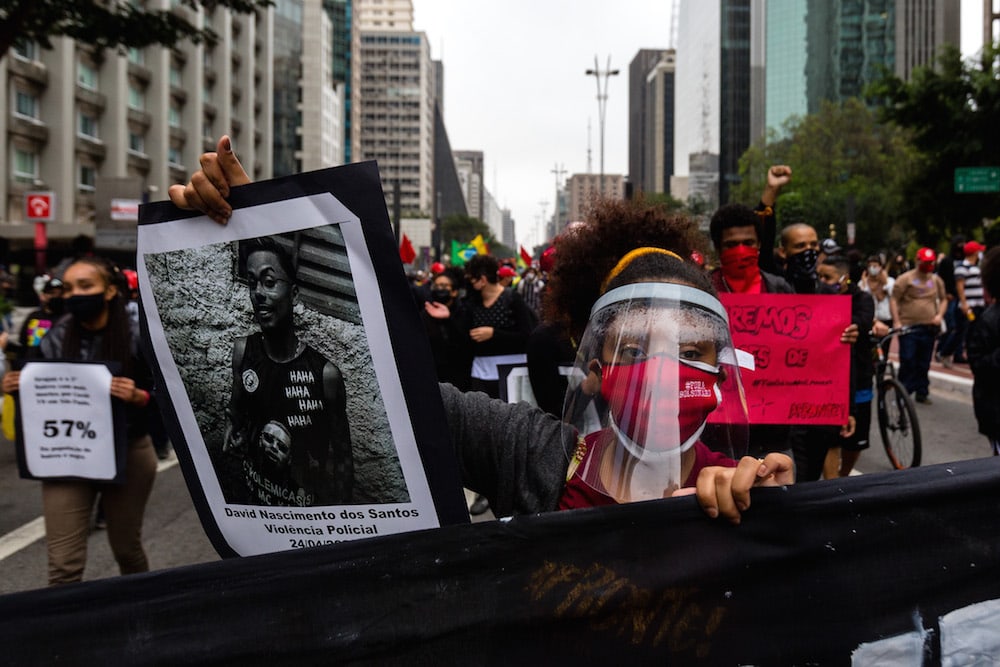June 2021 in the Americas: A free expression round up produced by IFEX's Regional Editor Paula Martins, based on IFEX member reports and news from the region.
Justice in sight
21 years ago, Alex Silveira was taking photographs for his newspaper at a demonstration in the main avenue of the megalopolis of Sao Paulo, in Brazil. It was a large protest of teachers and civil servants asking for salary increases and better working conditions. As in so many other demonstrations in Brazil, protesters were peacefully marching down the business centre of the city, when the military police arrived to disperse them. Police brutality in handling the demonstration led to confusion and the special forces were called; demonstrators then started to be targeted with rubber bullets. One hit Alex in the left eye – he lost 90% of his sight in it.
Alex’s case was not an isolated one. In addition to other cases of demonstrators with serious injuries caused by rubber bullets, including in the face and eyes, another photojournalist – Sergio Silva – was hit in 2013, also losing the vision in one of his eyes. In the lawsuit concerning his case, the Military Police confirmed that in that demonstration alone they had fired more than 800 rubber bullets. Giuliana Vallone, who also worked for a newspaper, was hit in the face around the same time – many protests were then taking place against the World Cup – and did not lose her eye or vision because her glasses protected her. She, however, still suffers the consequences of the injuries incurred.
In 2014, Alex’s case had been heard by the Sao Paulo State Tribunal, who decided that Alex should not be entitled to any type of redress or compensation, for he had ‘put himself in danger by continuing to cover the demonstration after the conflict with the police started’. In other words, Alex was to blame for his injuries.
In June 2021, the Brazilian Supreme Court overruled the 2014 sentence and ordered the State to pay Alex an indemnification. But perhaps even more important than that, the Court set a precedent about the behaviour of police forces during protests.
First, it affirmed that the police failed in their duty to protect the press in the exercise of their profession. Secondly, it confirmed that part of the work of the press is to be the eyes of the public in situations such as those that take place during demonstrations, monitoring the events and guaranteeing that authorities act within the limits of legality and proportionality. Finally, it confirmed that the evidence strongly pointed out to irregular behaviour by police forces, since all protocols for use of less than lethal weapons are clear that no shots should take place above the waist. Many witnesses have confirmed that such protocols are rarely followed, and many demonstrators have testified that police officers clearly aimed at them before shooting.
Brazilian journalists and freedom of expression groups celebrated the decision, including IFEX members
Abraji and ARTIGO 19. The hope is that the precedent will now be translated into real change in practices on the ground.
Countering a privacy challenge to the right to repair
In early June, IFEX member EFF joined a number of civil society groups in defending a recent right to repair law adopted by the State of Massachusetts, in the US.
Despite being approved with a significant majority (74.9%) the law was almost immediately questioned in courts by carmakers. According to them, the initiative – which would ensure independent repair companies would retain the ability to fix cars well into the future – could put at risk car owners’ privacy and could imply serious security risks. Right to repair groups clarified to Vice, however, that a less honourable reason was behind the huge resources invested by carmakers to halt the law: “If a mechanic can’t access the data in your car, they may not be able to make a repair and you’ll be stuck taking it into the dealership which can charge whatever they want.”
In an amicus brief presented to the Massachusetts court, EFF explained why the carmakers’ allegations are technically unfounded. They also argue that the right to repair gives consumers more control over the things they own and enhances competition.
Protests in Colombia continue
IFEX member Fundación para la Libertad de Prensa (FLIP) warns that reporters who have been covering the demonstrations in Colombia have been attacked, injured, threatened, and illegally detained. During the past two months, FLIP documented 260 cases and a total of 299 victims of attacks against the press, concentrated in cities where there have been ‘spaces of resistance’ such as Bogotá (73), Valle del Cauca (45), Antioquia (36), and Cauca (18).

https://www.flip.org.co/index.php/es/informacion/pronunciamientos/item/2749-record-de-periodistas-atacados-299-en-dos-meses
FLIP is concerned that instead of an increase in institutional awareness and action against violations, there has been a ‘normalization’ of the situation by relevant authorities. FLIP has urged the Inter-American Commission on Human Rights to strictly monitor the situation.
In a recent worrisome development, the Colombian Minister of the Interior, Daniel Palacios, has announced a modification in the norms applicable to public demonstrations. According to him, an amendment would be introduced to Decree 003/2021 which would establish that it does NOT constitute a ‘peaceful demonstration’ if it promotes the use of means to temporarily or permanently obstruct transport roads or infrastructure.
FLIP and a number of other Colombian organizations have highlighted that such modification would be unconstitutional and contrary to international human rights standards.
The independence of cyberspace
According to a new report by PEN America, ‘digital sovereignty’ is an expression that seeks to “explain and legitimize more expansive governmental regulation of the digital sphere in the national interest.”
The report looks at how the terminology was created by authoritarian governments and later expanded to be used by many others. At this point, there are different visions and definitions of digital sovereignty, but in general it refers to actions that risk creating silos, isolating the internet and our data in ‘national boxes’. Many actions have been taken using the justification of protecting users against the power of transnational corporations that would otherwise elude outdated national legislation. Governments have passed new laws “mandating data localization, granting them new powers over their citizens’ data and new levers of control over transnational corporations; they have pressured or forced companies to trigger digital shutdowns, becoming complicit in repression; they have demanded content takedowns and other forms of censorship.”
The report alerts us to the risk of fragmentation, and calls attention to the fact that we are currently living in a crucial moment in which states are taking crucial decisions about their “future model of internet governance – including fundamental decisions as to what level of digital freedom they afford their populaces.”
Read the full report here.
Information deserts and oases in Venezuela
According to an early 2020 report by Instituto Prensa y Sociedad Venezuela (IPYS Venezuela), more than 5 million Venezuelans were living in what the organization called ‘news deserts’. They carried out a study to identify the panorama of news deserts throughout the Venezuelan territory, based on a diagnosis and mapping of national, regional, and local media (print, television channels, radio stations and digital portals) that produced news on the 335 municipalities of the country.
Now, in 2021, the organization has launched a publication in which it looks at ‘information oases’. In areas where news content is “arid or sterile”, journalistic initiatives have flourished “based on innovation, collaboration, hyperlocalism and resilience”.

https://ipysvenezuela.org/desierto-de-noticias/oasis-informativos-el-fenomeno/
Doing journalism in contexts where coverage of public interest events is constantly conditioned by censorship, violence, and deteriorating communication infrastructure is particularly difficult. However, in the case of Venezuela these challenges have sparked efforts to adapt to such obstacles, overcome barriers, and continue reporting. The context may have ended up making Venezuelan news media more prepared for the major transformations of the media ecosystem that are taking place across the globe.
The IPYS study looks in particular at the experiences of five outlets: El Bus TV, El Pitazo, Radio Fe y Alegria, La Vida de Nos and Efecto Cocuyo. The recipe for success? Collaborative journalism, community support, adaptability and resilience, hyperlocalism, and networked work.
Read the full report here.
Less protection for personal data in Chile
According to IFEX member Derechos Digitales, the Chilean Congress approved, in June, a reform that increases the power of the state to process personal data, without elements that guarantee the protection of people’s rights.
A new System for Integral Social Protection Network was created to coordinate offering social programs to individuals and families at risk. However, such a system establishes a very broad legal authorization for the Ministry of Social Development and the Family to collect general information about beneficiaries of social programs, from public and private sources, including personal data.
Derechos Digitales explains that the text of the new legislation is problematic in itself, but the reform is even more worrisome in view of the fact that Chileans are still waiting for a data protection law to be approved by the Congress.
In brief
Peru – Only 1% of radio and television stations in Peru are community-based, while 73.5% are for commercial purposes and 25.37% are educational, according to the annual report “Radio and TV in Figures 2021” of the Radio and Television Advisory Council (CONCORTV).
Brazil – In Brazil, community radios are seeking the support of the Public Defender’s Office to review the conditions for their operation. The Brazilian Association of Community Radios asked authorities to increase the effective power (ERP) of transmissions from 25 watts to about 300 watts. They also requested that one more channel per municipality be available for community radios to operate on low frequencies, since the equipment to operate there is less onerous than on the extended band. Finally, the Association requested that the sector be allowed access to advertising funds, as a way to promote economic progress in the municipalities in which these media operate.
Mexico – Mexican media worker Saúl Tijerina was killed in Ciudad Acuña. Tijerina’s family lost contact with him early in the morning of 22 June, and his body was found near his vehicle later that morning with multiple stab wounds. Tijerina was a drone camera operator and provided footage to the Facebook-based news outlets La Policiaca and Noticias en la Web.
Canada – On 22 June, the Canadian House of Commons voted to pass Bill C-10. The bill has been strongly criticized by press freedom groups, who affirm it “poses a significant threat to the open Internet, and introduces sweeping new powers for the Canadian Radio-television Telecommunications Commission (CRTC).” Groups, including IFEX member OpenMedia, now call on the Senate to take its time in reviewing the bill, speaking to all stakeholders, and analyzing the implications of this sweeping legislation.



